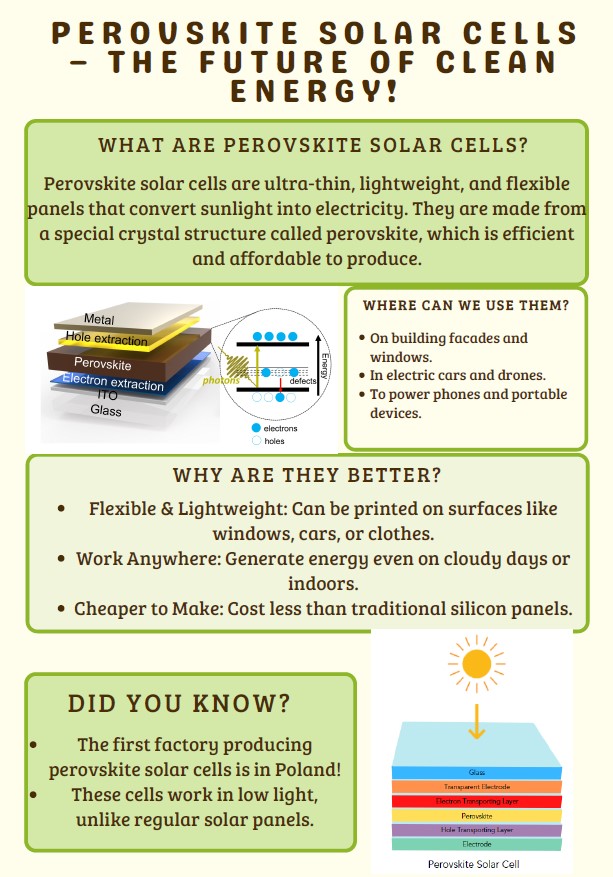Poland PA
Poland teams worked as 2 teams and prepared material from both Cities (Wroclaw and Starowice) as follows:

Research: Green Innovation in Starachowice, Poland
Starachowice, Poland, is becoming a hub for green innovation, driving sustainability through cutting-edge technologies and community-focused initiatives. The city is harnessing renewable energy sources, such as solar and wind power, while embracing energy-efficient solutions to reduce its carbon footprint. Innovations in waste management and recycling are transforming the way the community handles resources, turning waste into valuable assets. Starachowice is also fostering eco-conscious urban development, with green spaces, smart infrastructure, and sustainable transport systems playing a pivotal role. By collaborating with local businesses, educational institutions, and environmental organizations, Starachowice is positioning itself as a leader in Poland's green transition, inspiring other municipalities to follow suit. This commitment to sustainability reflects the city's vision for a cleaner, healthier, and more resilient future.
Poster: Perovskite Solar Cells—The Future of Clean Energy
Perovskite solar cells are revolutionizing the renewable energy landscape, emerging as a transformative technology in the quest for clean, efficient, and affordable energy. These cells, made from perovskite-structured materials, boast remarkable advantages, including high efficiency, lightweight design, and flexibility, making them versatile for various applications. Unlike traditional silicon-based solar panels, perovskite cells can be produced using low-cost manufacturing techniques, potentially reducing the overall cost of solar energy. Their ability to perform well in low-light conditions and their compatibility with flexible surfaces open up innovative possibilities for integrating solar energy into everyday objects, such as windows, fabrics, and portable devices. As research and development progress, perovskite solar cells hold the promise of transforming global energy systems, paving the way for a sustainable and carbon-neutral future.

Poster: Eco-School in Starachowice
The Eco-School initiative in Starachowice, Poland, is a beacon of environmental education and sustainability for the community. This program integrates eco-conscious principles into the school curriculum, fostering a generation of students who are aware of and committed to protecting the environment. Through hands-on activities like recycling workshops, energy-saving projects, and sustainable gardening, students learn practical ways to reduce their ecological footprint. The Eco-School also serves as a hub for community engagement, hosting events, and campaigns that inspire sustainable practices among residents. By promoting renewable energy use, waste reduction, and conservation efforts, the Eco-School in Starachowice is cultivating a culture of environmental stewardship, empowering young people to lead the charge toward a greener and more sustainable future.


Poster: Environmental Protection in Starachowice Municipality
The Municipality of Starachowice is dedicated to environmental protection through initiatives such as investing in renewable energy, modernizing waste management and recycling systems, and enhancing urban green spaces. It has introduced eco-friendly public transport, including electric buses, and developed cycling paths to reduce emissions. Efforts also focus on water conservation, tree planting, and environmental education programs in schools and the community. These actions reflect Starachowice's commitment to sustainability and a greener future.

Poster: The 3Rs: Reduce, Reuse, Recycle
The 3Rs—Reduce, Reuse, and Recycle—form the foundation of sustainable waste management. Reducing waste involves minimizing consumption and avoiding unnecessary products. Reusing focuses on extending the life of items by finding new purposes for them instead of discarding them. Recycling ensures that materials like paper, plastic, and metal are processed into new products, conserving natural resources and reducing pollution. Together, the 3Rs promote a circular economy, helping to protect the environment and combat climate change.

Poster: Sustainable Art in Poland
Poland's art scene is increasingly embracing sustainability, with artists and organizations integrating environmental consciousness into their creative processes. Sustainable art in Poland often involves using recycled and repurposed materials, turning waste into meaningful works that highlight ecological and social issues. Notable projects include public installations, eco-friendly exhibitions, and community workshops that raise awareness about sustainability and inspire action. Polish artists, such as the globally renowned Bordalo II, and grassroots initiatives focus on themes like climate change, biodiversity, and waste reduction, demonstrating how art can be a powerful tool for environmental advocacy. This growing movement reflects Poland's commitment to merging cultural heritage with ecological responsibility.

